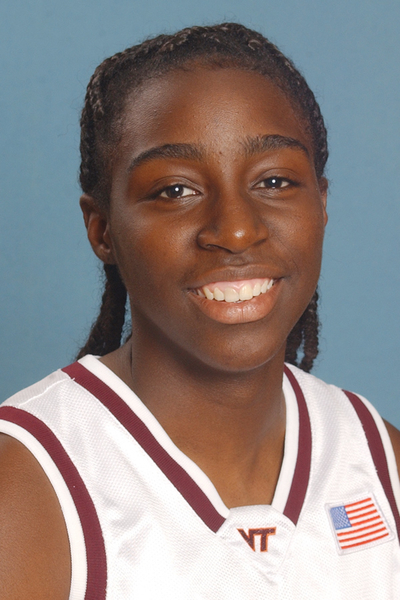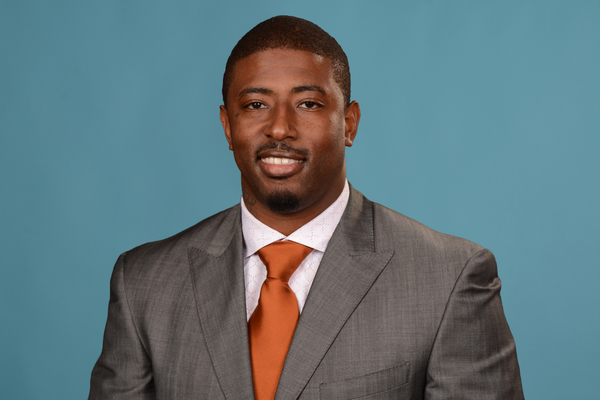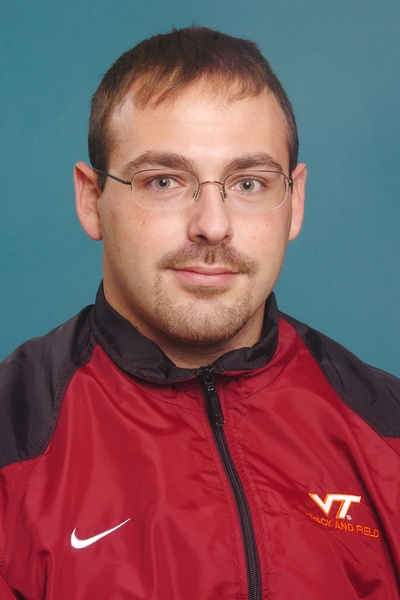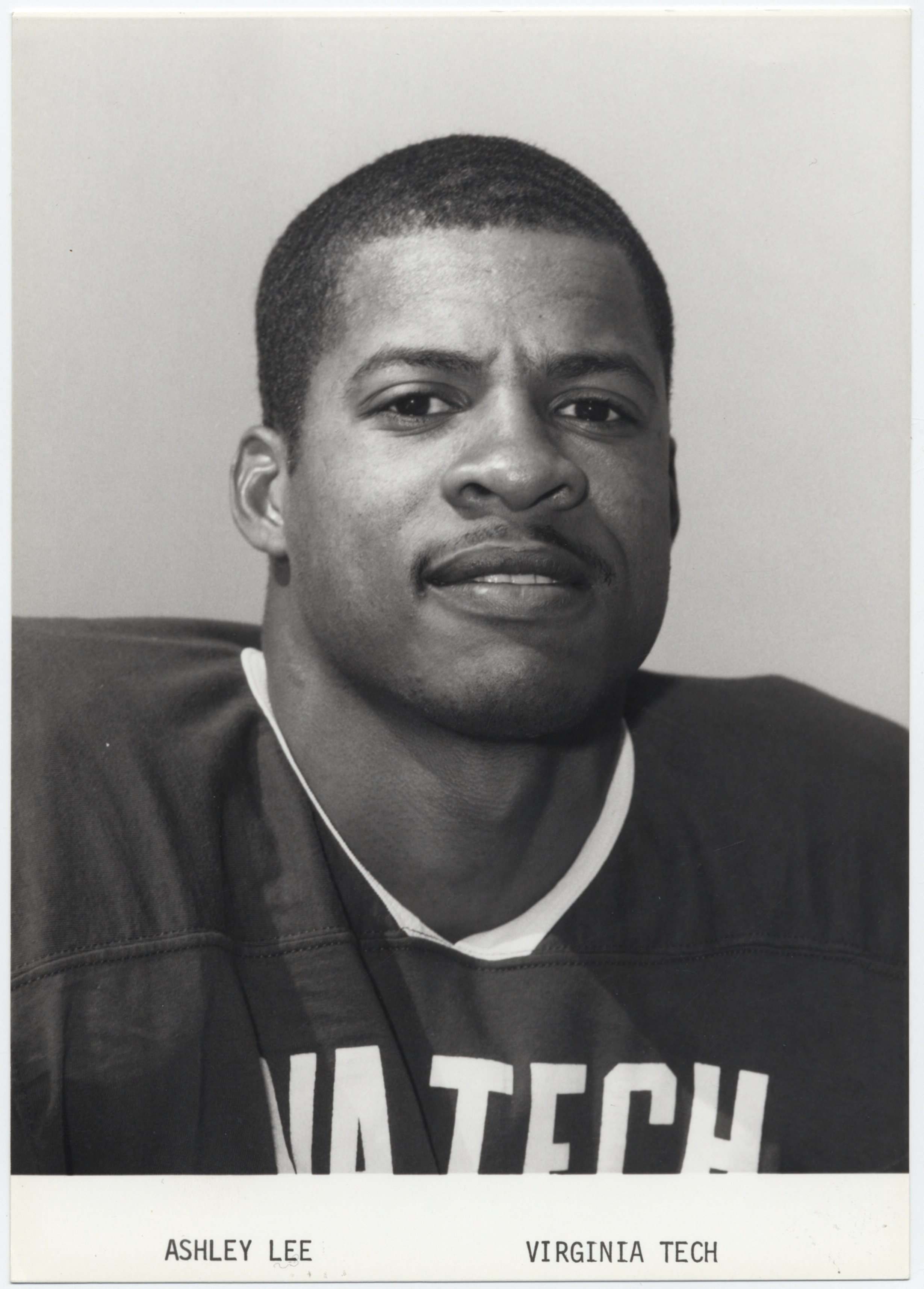
BLACKSBURG – Five former Virginia Tech student-athletes and a former administrator comprise the 2016 class set for induction into the Virginia Tech Sports Hall of Fame, as announced by the athletics department on Saturday evening.
The 2016 inductees are:
Kerri Gardin, a standout rebounder and scorer who led the Tech women’s basketball team to four NCAA Tournament berths;
DeAngelo Hall, a dynamic defensive back who scored touchdowns five different ways in his career and still holds or shares three school punt return records;
Kevin Jones, a powerful and productive tailback who earned All-America honors in 2003 and still ranks second on the school’s list for career rushing yardage;
Spyridon Jullien, an accomplished thrower on the track and field squad who won a school-record four individual national championships;
Ashley Lee, a linebacker/defensive back from the great Tech defenses of the early 1980s who still holds the NCAA record for interception return yardage in a game;
The late Jim Weaver, a former athletics director who guided the school’s transition into the BIG EAST and later into the ACC and who spearheaded $200 million worth of athletics facilities projects.
The six new honorees will be inducted during a Hall of Fame dinner on the Tech campus on Friday, Sept. 16, the evening before Tech’s home football game against Boston College. The inductees will be introduced to fans at halftime of the football game. The new inductees will bring the total number enshrined to 187. The Virginia Tech Sports Hall of Fame, which is located at the south end of the Cassell Coliseum ambulatory, was established in 1982.
Not every basketball player gets to play in an NCAA Tournament game, but Kerri Gardin was fortunate to play in at least one NCAA Tournament game all four years of her career from 2002-06.
She was a big reason why the Hokies received those NCAA Tournament berths. The Morganton, North Carolina product was so productive that she still holds or shares six of Tech’s single-game records and two single-season records. She also ranks in the top 10 in three career statistical categories.
Gardin averaged a modest 4.3 points and 3.2 rebounds per game during her freshman season of 2002-03. The next season, she worked her way into the starting lineup and averaged 7.8 points and 5.4 rebounds per game.
Gardin enjoyed a stellar junior campaign, averaging 11.1 points and eight rebounds per game. She shot 45 percent from the floor, blocked 29 shots, registered 39 steals, and earned honorable mention All-ACC honors following the season.
During her senior season of 2005-06, Gardin earned third-team All-ACC honors after averaging 12.7 points and 10 rebounds per game. She led the ACC in rebounding in conference games (9.4) and she set a Tech single-season record for rebounds (289). Her 21 rebounds against UVA tied a school record.
Also, as a senior, Gardin scored her 1,000th career point in the Hokies’ victory over Wake Forest. She recorded 24 double-doubles that season in leading the Hokies to the NCAA Tournament, a string that included a 17-point, 13-rebound, six-assist performance in the Hokies’ first-round win over Missouri.
Gardin currently ranks fifth in school history in rebounds (784), eighth in blocked shots (91), 10th in steals (157), and 21st in scoring (1,061).
Following the season, the Chicago Sky selected Gardin in the third round of the WNBA (34th overall). She became just the third Tech women’s basketball player drafted by a WNBA team (Tere Williams, Ieva Kublina). She played two seasons for Chicago, three seasons for the Connecticut Sun, and served a brief stint with the Washington Mystics. She also has played overseas.
Gardin currently lives in Radford, Virginia and recently retired from professional basketball. She is currently a high school basketball official and going through the process of becoming a college basketball officials. She also trains kids on a one-on-one basis on the side.
DeAngelo Hall ranks as one of the most dynamic defensive backs ever to put on a Virginia Tech jersey and made his presence felt rather quickly as a true freshman in 2001. In the first game of his collegiate career, the Chesapeake, Virginia native intercepted a pass – a sign of things to come. He would go on to intercept three passes that season, including one in his first career start, and record 42 tackles.
As a sophomore in 2002, Hall enjoyed a memorable season opener, returning an interception and a punt for a touchdown in the Hokies’ 63-7 victory over Arkansas State. He started 10 of 12 games that season and finished with 55 tackles and four interceptions. He also broke up 12 passes and forced a fumble. As Tech’s punt returner, he returned two punts for touchdowns and the Hokies concluded the year by beating Air Force 20-13 in the Diamond Walnut Bowl.
The following season, Hall became one of the rare players to score touchdowns in four different ways. Then-head coach Frank Beamer and his staff decided to use Hall on offense at certain times and he scored touchdowns both rushing and receiving. His 29-yard touchdown reception against UCF in the season opener was part of a 49-28 Tech win and his 24-yard touchdown run against Syracuse was part of a 51-7 rout of the Orangemen.
The game against the Orangemen was arguably the best of Hall’s career. In addition to scoring on the 24-yard run, he also returned two punts for touchdowns, becoming the first and only player in school history to return two punts for touchdowns in the same game. That record still stands.
Later that season, Hall scored on a fumble return. His 28-yard strip and return against Miami sparked the Hokies to a 31-7 victory over the then-No. 2 Hurricanes in one of the biggest wins in program history.
He finished the season with 93 tackles (63 solo). That included a 13-tackle performance in Tech’s Insight Bowl loss against California, a game in which he also returned a punt for a touchdown.
Hall earned All-America honors following the 2003 season, but the bowl game marked his final collegiate game, as he decided to forgo his final season and make himself available for the NFL Draft. He still holds or shares the school record for punt returns for a touchdown in a game, in a season (3), and in a career (5).
The Atlanta Falcons selected Hall with the No. 8 overall pick in the first round of the 2004 NFL Draft and he has played in the NFL ever since. He currently is in his eighth year as a defensive back with the Washington Redskins.
Kevin Jones came to Virginia Tech out of Chester, Pennsylvania as the most highly rated recruit in the football program’s history and his play on the field lived up to that lofty status.
By the start of the 2001 season, Jones had worked his way onto the depth chart at tailback, and by the ninth game, he was the starter. He rushed for 957 yards and five touchdowns that season, setting a school record for rushing yards by a freshman.
Jones averaged 165.3 yards rushing per game in the final three games of the 2001 regular season. That included a 37-carry, 181-yard game against Virginia in which he set a Tech freshman record for carries in a game. The 181 yards were the second-most ever by a running back under then-head coach Frank Beamer at the time. Following the regular season, Jones was named the BIG EAST Rookie of the Year.
In 2002, Jones teamed with Lee Suggs to form one of the nation’s most prolific tailback duos. Even splitting time with Suggs, he still rushed for 871 yards and nine touchdowns, including a 171-yard performance against Marshall and a 144-yard game against Boston College.
As a junior in 2003, Jones handled most of the workload, rushing for 1,647 yards on 281 carries and scoring 21 touchdowns. He broke the school’s single-season rushing record at the time and his nine 100-yard games were also a school record at the time.
The eyes of the nation watched as Jones rushed for 188 yards and three touchdowns against Texas A&M on a Thursday night and he later set a school record with a 241-yard rushing performance in a game at Pittsburgh later in the season.
Following the season, he earned first-team All-BIG EAST honors. He also was a first-team All-American by four different associations.
His junior season marked his final one in a Tech uniform, as he decided to forgo his senior season and make himself available for the NFL Draft. He concluded his career with 3,475 rushing yards – a number that still ranks second today.
The Detroit Lions selected Jones in the first round of the 2004 NFL Draft and he played five seasons in the NFL before injuries cut short his playing career. He returned to Tech to finish work on his degree in industrial design, which he received in 2011, and he worked for more than two years in the Tech athletics department.
Today, Jones, wife Robyn and their three children live in Blacksburg. He works for the company he co-founded – JoBa Design – and recently began pursuing an MBA from Tech.
To say that Spyridon Jullien finished his Virginia Tech career in grand fashion would be an understatement. He not only won the national championship in track and field’s hammer throw event, but he did so on his final toss.
That throw concluded a career in which Jullien won a school-record four national championships in the sport of track and field and earned seven All-America honors, a school record that he shares with former track standout Kristi Castlin.
Jullien, a native of Athens, Greece, came to Tech in 2003 and began competition during the indoor season. He won the BIG EAST title in the weight throw with a school record toss of 21.73 meters (71 feet, 3.25 inches) and went on to finish 16th at the NCAA Division I Indoor Track and Field Championships.
During the outdoor season that year, he won the BIG EAST title in his specialty – the hammer throw – with a school-record toss of 69.60 meters (228 feet, 4 inches). He finished sixth in the event at the NCAA Division I Outdoor Track and Field Championships.
In 2004, Jullien won the BIG EAST championships in the weight throw and the hammer throw again. He finished fourth in the weight throw at the NCAA indoor meet and second in the hammer throw at the NCAA’s outdoor meet, earning All-America honors twice.
Virginia Tech began competition in the ACC during Jullien’s junior season and he proceeded to win ACC titles in both the weight throw and the hammer throw. He also won his first – and the school’s first – national championship when he claimed the gold medal in the weight throw with a toss of 23.18 meters (76 feet, .75 inches). In addition, he won the national title in the hammer throw with a mark of 70.34 meters (231 feet, 1 inch).
As a senior in 2006, Jullien won the national title in both the weight throw and the hammer throw. At the NCAA Division I Indoor Track and Field Championships that year, he set a school record with a throw of 23.73 meters (77 feet, 10.25 inches) en route to the gold medal. At the NCAA Division I Outdoor Track and Field Championships, he won the gold medal in the hammer throw with a mark of 72.29 meters (237 feet, 2 inches), which came on his last attempt.
In addition to winning four national championships and earning seven All-America nods, Jullien won six gold medals at conference meets. He still holds the school record in the weight throw (23.73 meters; 77 feet, 10.25 inches) and his hammer throw record lasted for five years.
Jullien currently works for a medical equipment company in his hometown of Athens.
Ashley Lee was a key cog on the Hokies’ talented defenses of the early 1980s and still holds an NCAA record to this day. In a game against Vanderbilt on Nov. 12, 1983, Lee intercepted two passes, returning one 88 yards and the other 93 yards – both for touchdowns. He established an NCAA single-game mark for interception return yardage, snapping the previous mark held by Southern California’s Charles Phillips, who recorded 181 yards on two interceptions in a game against Iowa in 1974.
Lee committed to Virginia Tech after guiding Southampton High School in Franklin, Virginia to two state championships and he jumped into the starting lineup as a freshman for then-head coach Bill Dooley in 1980. Though only around 185 pounds, he found himself at linebacker and his speed and instincts made up for his lack of size.
Lee recorded 95 tackles (54 solo) as a freshman, including eight for a loss, and earned freshman All-America honors from Football News. In part because of his play, the Hokies earned a berth in the 1981 Peach Bowl.
The next season, he played even better, finishing with 146 tackles (75 solo), including five for a loss. He led the team in tackles both seasons on a defense that featured guys like Robert Brown, Bruce Smith, Jesse Penn, and Mike Johnson.
Lee missed nearly all of his junior campaign after tearing his ACL on the season’s first play. Dooley and his staff moved Lee to safety the following year and Lee bounced back, recording 77 tackles and breaking up 10 passes. As a fifth-year senior, he recorded 105 tackles and seven interceptions, helping the Hokies receive a berth in the 1984 Independence Bowl.
Lee finished his career with 423 tackles and 11 interceptions – a number that ranks tied for 10th on Tech’s all-time list. Perhaps more impressively, Tech’s defense ranked as one of the best nationally during his career, allowing just 11 touchdowns the entire season in 1980 and 1983 (11 games each year).
In 1985, the Atlanta Falcons selected Lee in the eighth round of the NFL Draft. He lasted in the Falcons’ preseason camp until the last cut before the Falcons’ staff released him. He tried to land a job in the United States Football League, but that league folded shortly thereafter.
Lee later returned to Tech and earned his degree in sociology in 1986. He and his wife have two children and live in his hometown of Franklin, where he currently owns a home improvement business.
Jim Weaver, who worked in college athletics for more than three decades, served as the athletics director at Virginia Tech for more than 16 years from 1997-2013 and played an instrumental role in helping school navigate through tumultuous times in relation to conference affiliation.
A little more than two years after his arrival, Weaver helped get the school into the BIG EAST for all sports (except wrestling, which was in the Eastern Wrestling League) starting with the 2000-01 season. His ability to get the department on solid financial footing, his emphasis on facilities, and his strong oversight in the areas of NCAA compliance set the groundwork for the school’s invitation into the ACC for all sports starting with the 2004-05 season.
Weaver’s biggest impact, though, may have been his emphasis on facilities. The department committed nearly $200 million toward facilities during his time as the AD.
Weaver spearheaded the building of the south end zone at Lane Stadium and later the expansion of the west side of the stadium. He also oversaw the building of the Hahn Hurst Basketball Practice Center, the new football locker room, the new baseball hitting facility, and many other projects and renovations. At the end of his tenure, he got approval for the new indoor practice facility, a project that was completed last summer and a building that ranks among the best of its kind in the nation.
He also hired many successful coaches, including current head coaches Kevin Dresser (wrestling), Dave Cianelli (director of track and field), Jim Thompson (men’s tennis), Ned Skinner (swimming and diving), and Chugger Adair (women’s soccer).
In addition, Weaver expanded the department’s auxiliary units, such as strength and conditioning, sports medicine and marketing; he added women’s golf to the list of varsity sports at Tech; and he fought for a larger staff in Tech’s Student-Athlete Academic Support Services. When he started, the staff essentially consisted of a few people. Now, it consists of 10 full-timers, and that staff has played a huge role in Tech’s impressive rise in graduation rates among student-athletes.
Weaver’s accomplishments didn’t go unnoticed nationally. In 2009, he won the prestigious John L. Toner Award presented by the National Football Foundation and College Football Hall of Fame. The award is given each year to a director of athletics who has demonstrated superior administrative abilities and shown outstanding dedication to college athletics and particularly college football. He also was named the AD of the Year by the National Association of Collegiate Directors of Athletics (NACDA) in May of 2014.
Primarily because of health issues, Weaver retired at the conclusion of the 2013 calendar year. He passed away in July of 2015, leaving behind wife Traci and four sons – Josh, Paul, Cole and Craig.
For updates on Virginia Tech Athletics, follow the Hokies on Twitter Follow @hokiesports
 Ticket Market Place
Ticket Market Place
 Sports Radio Network |
Sports Radio Network |  Travel Center & Info
Travel Center & Info


